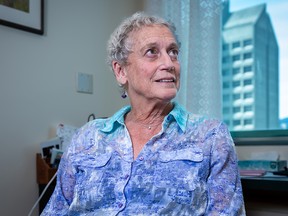The man suffered from treatable chronic back pain, his family says. And the assisted-death law currently excludes people whose sole underlying medical condition is a mental illness

Article content
Canada’s assisted-death law is unconstitutional and exposing people with coexisting physical and mental illness to “heightened risks of premature death” facilitated by the state, according to a wrongful death claim filed by the family of a 52-year-old man who was euthanized in a Vancouver clinic while out on a day pass from a hospital psychiatric ward.
It is the latest case involving a family challenging the lawfulness of an assisted death provision in Canada. Among those named is Dr. Ellen Wiebe, one of Canada’s most prolific providers of medically assisted death who has administered life-ending drugs to more than 400 people.
Advertisement 2
Article content
Identified only as J.M.M., the B.C. man had a long history of mental illness and was formally diagnosed with bipolar disorder around 2013, according to a statement of claim filed in the Supreme Court of British Columbia by the man’s former spouse, his father and his three children.
He also suffered from “remediable,” meaning treatable, chronic back pain, the family alleges. His back pain “was neither grievous nor irremediable and therefore did not meet the statutory eligibility criteria for MAID,” according to their claim.
The current assisted-death law also temporarily excludes people whose sole underlying medical condition is a mental illness from accessing MAID until at least 2027.
But the law doesn’t exclude people with concurrent mental and physical illness from accessing an assisted death.
The family claims that J.M.M. lacked the capacity to make decisions about his health or consent to MAID due to his mental illness, which would render him ineligible for MAID. His request for MAID was also influenced “by external pressure including concerns about personal finances,” they allege.
Article content
Advertisement 3
Article content
“Despite this, J.M.M. was wrongfully approved for MAID by the defendants,” the family alleges. “In facilitating J.M.M.’s access to MAID, the defendants acted negligently or recklessly, causing J.M.M.’s death.”
“After being allegedly approved for MAID, J.M.M. indicated that he did not wish to proceed with the procedure and wished to pursue other means to relieve any suffering he had including rehabilitation,” according to the claim, which has not been tested in court.
The family said they didn’t receive a response when they raised concerns over the legitimacy of the approval for MAID.
Recommended from Editorial
In late 2022, the family obtained a court order committing J.M.M. to the psychiatric ward of St. Paul’s Hospital, where his treating doctors “opined that J.M.M. should not receive MAID due to his mental illness, which impaired his capacity to consent,” according to the claim.
“Nonetheless, the defendants negligently or recklessly” allowed J.M.M. to leave the hospital on a day pass, the family alleges. The man went to Wiebe’s clinic that afternoon and died “through the improper administration of MAID,” according to the claim. The family said they only learned of his death afterward.
Advertisement 4
Article content
The man’s death resulted from the “wrongful action of the physicians and institutions that facilitated MAID,” according to the filing, “as well as the unconstitutional regulation of MAID by the federal and provincial governments.” They also argue that the federal MAID framework and corresponding provincial policies infringe on the Charter rights to life, liberty and security of the person.
In addition to Wiebe, the lawsuit includes the Attorney General of Canada, B.C.’s minister of health, Wiebe’s Willow Reproductive Health Centre (in addition to MAID, Wiebe provides reproductive health care and medical abortions), Provincial Health Services Authority, Vancouver Coastal Health Authority and Providence Health Care Society.
All three health authorities said they are aware of the civil claim but cannot comment about any patient cases due to privacy and confidentiality.
The B.C. health ministry said in a statement that it “is unable to comment on any specific cases due to patient privacy and confidentiality.”
Wiebe did not respond to a request for comment before deadline but told other media she did not want to comment.
Advertisement 5
Article content
It is the second case in as many months involving Wiebe. In October, a B.C. judge granted an urgent injunction stopping a woman’s death by MAID the day before it was scheduled to take place. The injunction granted to the woman’s common-law partner prevented Wiebe or any other medical professional from helping end the 53-year-old Alberta woman’s life within 30 days.
As reported by The Canadian Press, the woman, who was diagnosed with bipolar disorder, was convinced she had akathisia, an inability to sit still that can be a side effect of different medications, especially antipsychotic drugs. Two Alberta specialists with expertise in the condition felt the akathisia was treatable and could resolve with treatment within two to six months.
The latest case “would confirm, if the allegations turn out to be correct, that there are already serious concerns that non-specialists feel comfortable to end the life of persons with mental illness who need care and protection, rather than death as therapy,” said Trudo Lemmens, a professor of health law and policy at the University of Toronto.
Advertisement 6
Article content
Particularly troubling, he said, “is how a physician ended the life a patient who was hospitalized under provisions in the mental health act that aim at protecting patients and avoiding their deterioration.
“Either the MAID provider knew, as seems to be alleged by the family, or the MAID provider failed to identify underlying mental health issues, and appears to have failed to exercise due diligence.”
National Post
Our website is the place for the latest breaking news, exclusive scoops, longreads and provocative commentary. Please bookmark nationalpost.com and sign up for our newsletters here.
Article content







